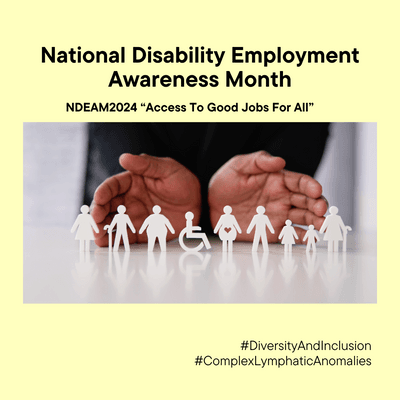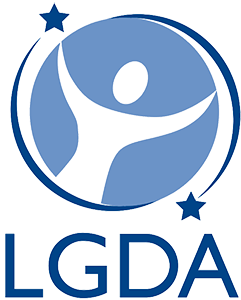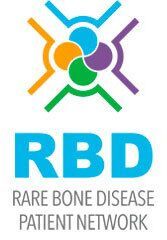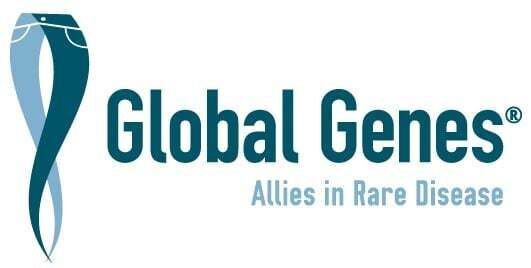
October marks National Disability Employment Awareness Month (NDEAM), a time dedicated to recognizing the contributions of workers with disabilities and highlighting the importance of inclusive employment practices. This year’s theme, “Access to Good Jobs for All,” underscores the need for equitable opportunities for people with disabilities, including those living with rare diseases like Complex Lymphatic Anomalies (CLAs).
For individuals in the CLA community, finding and maintaining meaningful employment can come with unique challenges. These rare conditions can lead to a variety of physical and medical complications, and are not well-understood by the public. Some people with CLAs may have visible signs of the condition, such as swelling or mobility challenges, while others experience invisible symptoms like chronic pain, fatigue, or respiratory issues. Whether visible or not, these symptoms can impact their ability to perform certain tasks or maintain a typical work schedule.
The Need for Inclusive Workplaces
For those living with CLAs, an inclusive and supportive workplace is essential. People with rare diseases often need accommodations, such as flexible work hours, the ability to work remotely, or ergonomic adjustments. However, the decision to disclose a rare disease to an employer can be difficult. There are valid concerns about being treated differently, passed over for promotions, or facing misconceptions about their abilities. Creating a work environment where employees feel safe and supported in discussing their health challenges without fear of discrimination is key to their success.
It is crucial that employers understand the need for flexibility and are educated on the potential impacts of rare diseases like CLAs. Providing accommodations not only ensures compliance with disability rights but also fosters a culture of empathy and inclusion, allowing employees to perform at their best.
The Barriers to Employment
For people with CLAs and other rare diseases, one of the most significant barriers to employment is the lack of awareness about their condition. Due to the rarity and complexity of CLAs, employers and coworkers may not fully grasp the nature of the disease or the challenges it presents. This can lead to misunderstandings, lack of accommodations, or assumptions about an individual’s ability to perform their job.
National Disability Employment Awareness Month shines a spotlight on the need to break down these barriers. Employers are encouraged to educate their staff on disabilities, including rare diseases, and to actively create an inclusive culture that values the diversity of their workforce. NDEAM also provides an opportunity for individuals with CLAs to advocate for themselves, share their experiences, and contribute to the broader conversation about disability employment.
How Employers and the CLA Community Can Get Involved
NDEAM offers several ways for both individuals and employers to participate and promote inclusive employment practices:
1. Education and Awareness: Employers can organize workshops or training sessions to educate staff on disabilities, including invisible ones like CLAs. This helps to foster a deeper understanding of the unique challenges people with rare diseases face.
2. Review and Update Workplace Policies: Organizations should take the opportunity to review their workplace policies and ensure they are inclusive and accessible to all employees, particularly those with disabilities.
3. Promote Stories of Success: Sharing stories of employees living with CLAs who have succeeded in their careers can help break down stigmas and inspire others. Highlighting how accommodations and an inclusive environment made a difference can encourage others to adopt similar practices.
4. Encourage Open Dialogue: Building a culture where employees feel comfortable discussing their needs and receiving the support they deserve is critical. Employers can use NDEAM as a platform to initiate conversations about how to better support employees with rare diseases.
5. Partner with Advocacy Organizations: Companies can also collaborate with organizations like the Lymphangiomatosis & Gorham’s Disease Alliance (LGDA) to support awareness efforts and better understand the needs of individuals with CLAs.
Moving Forward
National Disability Employment Awareness Month reminds us all that access to good jobs should be a right, not a privilege. For those living with Complex Lymphatic Anomalies, employment can offer a sense of purpose, independence, and fulfillment. However, this is only possible if employers create environments where these individuals feel supported and valued.
This October, join us in celebrating NDEAM by supporting inclusive employment practices and raising awareness about the importance of workplace accommodations for individuals with Complex Lymphatic Anomalies and other rare diseases.










